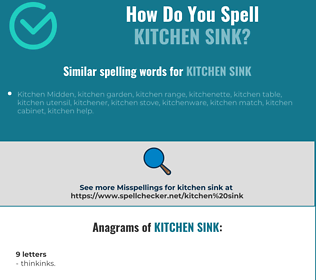KITCHEN SINK Meaning and
Definition
-
Kitchen sink can refer to two different definitions.
The first definition of kitchen sink is a literal one, referring to the fixture found in a kitchen used for washing dishes, utensils, and other kitchenware. It is typically made of metal or ceramic, containing a basin with a faucet and drain. The kitchen sink is an essential component of a kitchen, allowing for the efficient cleaning and maintenance of various kitchen items.
The second definition of kitchen sink is more metaphorical. In this context, it is an idiomatic expression used to describe something that contains or includes everything possible, often to the point of excess or overkill. It implies a situation or item that encompasses everything imaginable, leaving nothing out. For example, a movie may be described as having "everything but the kitchen sink" if it includes an abundance of different plotlines, characters, and special effects. Similarly, a person's to-do list may be described as including "everything but the kitchen sink" if it is filled with an overwhelming number of tasks.
Overall, kitchen sink can refer either to a physical fixture in a kitchen used for washing dishes or to a metaphorical concept describing something that includes an excessive or comprehensive amount of various elements.
Common Misspellings for KITCHEN SINK
- jitchen sink
- mitchen sink
- litchen sink
- oitchen sink
- iitchen sink
- kutchen sink
- kjtchen sink
- kktchen sink
- kotchen sink
- k9tchen sink
- k8tchen sink
- kirchen sink
- kifchen sink
- kigchen sink
- kiychen sink
- ki6chen sink
- ki5chen sink
- kitxhen sink
- kitvhen sink
Etymology of KITCHEN SINK
The word "kitchen sink" is a compound noun consisting of the words "kitchen" and "sink". Here is the etymology of each word:
1. Kitchen:
- The word "kitchen" originated from the Old English word "cyċen" which referred to a cooking place or kitchen.
- It can be traced back to the Proto-Germanic word "*kōkina" which means "cookplace".
- This word has cognates in several other Germanic languages, such as the German word "Küche" and Dutch word "keuken".
2. Sink:
- The word "sink" comes from the Old English word "sincan" which means "to become submerged or sink".
- It is related to the Proto-Germanic word "*sinkwaną" which has the same meaning.
Idioms with the word KITCHEN SINK
-
everything and the kitchen sink
The idiom "everything and the kitchen sink" refers to a situation or object that includes an excessive amount of things or elements, often beyond what is necessary or expected. It implies that not only are all the basic components included, but also any additional and unnecessary ones.
-
everything but/except the kitchen sink
The idiom "everything but/except the kitchen sink" means including nearly everything conceivable or possible, often used to describe a situation or event where an excessive or unnecessary amount of items or elements are involved. It refers to a scenario in which practically everything has been included or added, leaving out only the most essential or basic thing.
-
everything but the kitchen sink
The idiom "everything but the kitchen sink" means that someone is including or incorporating everything possible, or going to extremes in including all possible items or options, often in an excessive or exaggerated manner. It implies that nearly everything has been included apart from the most impractical or nonsensical things.
-
everything but/bar the kitchen sink
The idiom "everything but/bar the kitchen sink" is used to describe a situation where nearly everything or an excessive amount of things are included or utilized, leaving out only the most impractical or unnecessary items. It implies that almost everything imaginable has been included or considered.
Similar spelling words for KITCHEN SINK
- Kitchen Midden,
- kitchen garden,
- kitchen range,
- kitchenette,
- kitchen table,
- kitchen utensil,
- kitchener,
- kitchen stove,
- kitchenware,
- kitchen match,
- kitchen cabinet,
- kitchen help.
Infographic
Add the infographic to your website:





